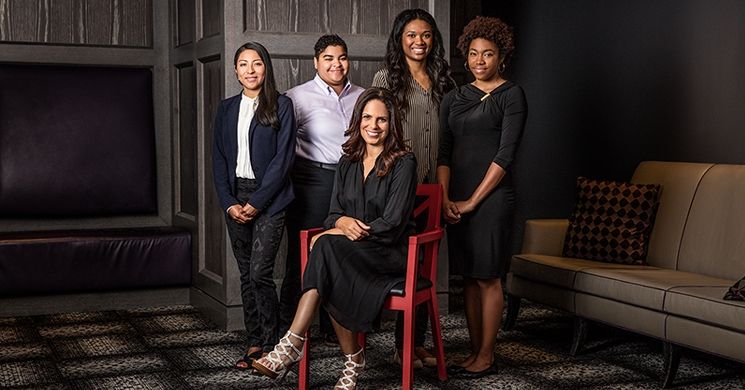A much-celebrated former television anchor and correspondent for CNN, HBO, Al Jazeera America and other high profile outlets, Soledad O'Brien now produces documentaries, TV series and live events as the head of her own production company, Starfish Media Group.
We recently caught up with O'Brien for a chat about her journey through journalism, entrepreneurship and philanthropy as well as some of the best advice she passes on to her scholars through the PowHERful (formerly Starfish) Foundation, which provides financial assistance, mentoring and other support to help put high school scholars through college.
A college experience is only partially about the academics. It really is about the growth of a human being.
What inspired you to launch the PowHERful Foundation?
When I was reporting on Hurricane Katrina, the aftermath and recovery was so disorganized. For example, people would apply for $1,000 to fix their roof but only get $864, which might seem like a lot but isn’t enough to actually get the work done. I saw that same issue happening a lot in education — students would get a $2,500 scholarship, which is amazing, but it’s just not enough to send you to college. Noticing that gap inspired us to start a foundation with the mission of getting students to and through college. The through part is really essential.
How does the PowHERful Foundation support its scholars?
At first I thought our goal was simple — we were just helping someone get a college education. We soon recognized that students required more than just financial help, however: They also were in need of a lot of emotional support, tutoring, mentors, internships, jobs and guidance for graduate school. A college experience is only partially about the academics. It really is about the growth of a human being — how to discover their own path to self-awareness, nurturing their ability to advocate for themselves, and navigating their way through a job market, which can be quite challenging.
You emphasize the importance of advocating for yourself. What does that mean to you?
Advocating for yourself means you have a plan not only for success, but also for how to get back on track when something goes wrong. It’s not necessarily about doing everything yourself, though. We tell students to go into college with a list of three people they know they can call if something goes horribly awry, keeping in mind that sometimes that’s not their mom and dad! It's really about having a strategy to advocate for yourself in every situation and knowing when you need help doing that.
What has given you your confidence and how do you inspire it in others?
I attribute a lot of my accomplishments to the lessons my parents taught me. They instilled an incredible sense of responsibility in us. They told us that the best way to achieve your goals is to deconstruct where you’re trying to get to, break it down into actionable steps you could take to get there, and put your head down and work really hard.
My mother always used to say that most people have no idea or what it takes to be successful, so just don't listen to them. Decide what you're going to go do and go do it. Be willing to work hard. And, if you're smart, you’ll surround yourself with people who will give you helpful advice to get to the next step. That's really what success is — the ability to stay determined towards a goal and realize when you need support from others. It's not this “magic sense” that often comes to mind when we talk about successful people.
You've risen quickly through the ranks in broadcast journalism and moved to become an executive producer. What one piece of advice would you give someone taking on a new leadership role in their career?
To be successful in a leadership role, you really have to understand that you, as an individual, can only do so much. At the end of the day, your goal should be to leverage the people around you and empower them to do great work so that you can also focus on your best work.
Everything I've ever done — whether it was anchoring a show, reporting in the field, starting a production company, starting a foundation — was successful because I managed to find really great people who saw the vision the way I saw it.
How do you balance motherhood and your busy career?
I never really thought of motherhood as a challenge professionally. The logistics could be challenging, but being a parent and maintaining a career adds so much to your life. And you know, working can really help you be a better parent. It's great to show a kid what it takes to be successful in life.




